Last week I was invited to attend an APSE Parks and Greenspaces Advisory Group online meeting that brought together over 100 parks professionals to hear four interesting presentations.
First up were speakers Ben Russell, future parks manager and Andy Maddox, business development manager from Doncaster Council, who gave an insight into new ways of recording important demographic information – such as knowing the number of visitors who are using their parks and greenspaces. The project is part of the Get Doncaster Moving Strategy.
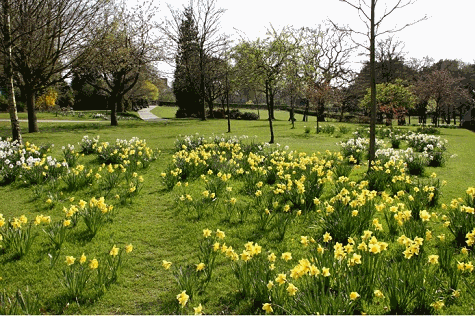
The age of austerity, as far as council budgets are concerned, is still with us, and therefore many services particularly non-statutory ones are having to prove their worth. The importance of being able to show how many people use our parks and greenspaces is critical if we are to retain and attract additional funding - especially with the huge increase in visitor numbers as a result of the pandemic placing additional pressures on parks budgets.
We heard how local authorities are identifying visitor numbers using the latest technology which utilises GPS positioning from mobile phones giving footfall, dwell time and also a heat map of the parks usage.
The combination of having entrance counters, coupled with the investment in the latest software collection systems have transformed the way we can manage our landscape assets.
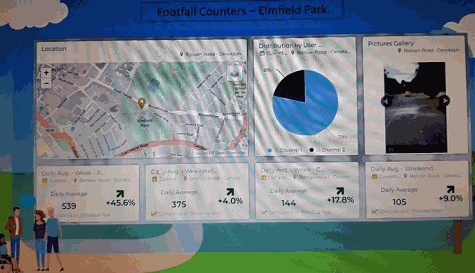
This accurate data gathering can assist with footfall trend information. Understanding when people are using our parks allows managers to time relevant maintenance activities and maximise event programmes within our parks.
In Doncaster this information enabled the council to further enhance and improve their parks entrances and floral displays. These new management software packages are now an essential tool for local authorities.
The next presentation from Steve White, CEng MIET, head of business development of YOTTA who further endorsed the value of these new improved management systems and how they play an important part the everyday decision making in the delivery of parks and local authority services.
The fact they are able to interlink with GPS, social media platforms and mobile phone services ensure they have great flexibility and working abilities to deliver, monitor and record day to day activities undertaken by local authority staff.
These systems have certainly enabled different sectors and departments to work more closely, making significant savings in time and better use of resources to deliver a wide range of local authority services.
With the need to reduce carbon emissions entrenched in many local authorities climate and ecological emergency plans, services are having to look at ways in which they can change their traditional methods of operation to reduce their emissions. That is why many services which rely on petrol driven machinery are now looking at alternatives. These alternatives are still being trialled in many instances.
We then learnt from an interesting presentation how two local authorities had experienced the use of battery powered tools when comparing them with their current petrol-powered hand tools.
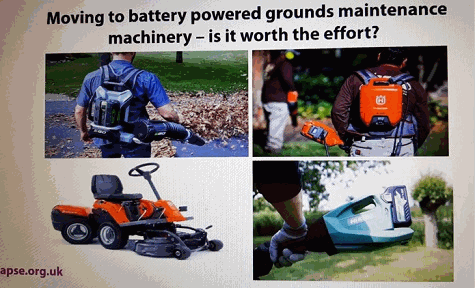
They certainly endorsed that they were much quieter had less hand vibration than their petrol-powered equivalents - however, they still had some concerns centred on their power, performance, running and recharging times.
They had received mixed feedback from their operatives, with one of the biggest problems that they encountered was the re-charging of the batteries. It became apparent from health and safety people that you obviously need safe charging areas. At present not many authorities are fully prepared or geared up for a complete change over to battery powered tools.
However, one local authority that has embraced battery technology, stated they had seen a more positive reaction of their staff who embraced and enjoyed the reduced levels of vibration, noise and pollution.
It would seem from the presentations that battery powered equipment will no doubt become more widely used by local authorities in the coming years, especially when the costs and the logistics of changing over becomes more viable.
Green Flag
The final presentation was centred on the success of the Green Flag programme and the fact that they will be launching a new research hub for members to utilise in March.
2,127 parks and green spaces have collected a coveted Green Flag Award for 2021 as the scheme celebrates 25 years as the international quality mark for parks.
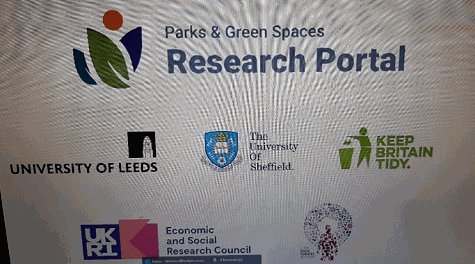
During the pandemic we have seen green spaces become lockdown lifelines, playing a vital role for people across the country as places to relax, exercise and meet friends and family safely. The news that a record number have achieved the Green Flag Award standard is testament to the hard work and dedication of those tasked with looking after these national assets.
As a Green Flag judge and retired parks manager myself, I know only too well the value and importance of these green spaces and what they bring to our communities. It is important we continue to invest, develop and maintain these important lands assets. The role of the Green Flag programme is to help support local authorities in maintaining a national standard of horticultural excellence within these parks and public open spaces.
Green Flag offer a range of help and resources. One is the resource hub - a library of free, high-quality sector knowledge, curated from all over the world. Resources are provided by a range of partners, who support their commitment to sharing best practice. And the other is the research portal, another free platform to explore the latest research findings, events and collaboration opportunities from academic and research organisations across the globe.
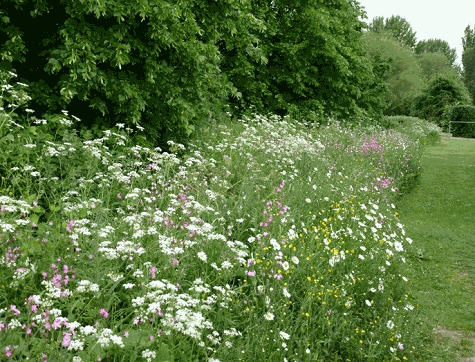
This new platform has been created by the partnership formed between Green Flag with Leeds and Sheffield Universities led by Dr Anna Baker. The aim of the portal is to become a collaborative platform that enables the sharing of university research projects that relate to land management and parks services.
I personally think this great initiative has been long overdue. I remember back in 2003 when I completed my Masters degree at Cranfield University I was disappointed that there was no opportunity to share valid research papers to the wider public. I will certainly be looking forward to this new portal with interest.
Bayer & CALM
Finally, to round of this week’s newsletter I just want to draw your attention to an important announcement that the suicide prevention charity, Campaign Against Living Miserably (CALM) will be joining Bayer Environmental Science at exhibitions throughout 2022, starting with BTME in March, as the partnership between the two continues for a second year.
Read all about it here.